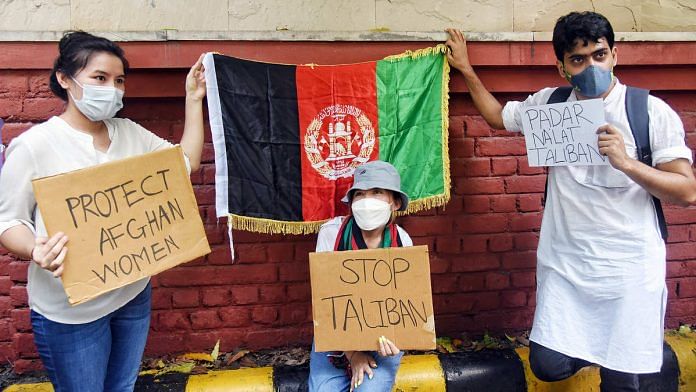With its composition of government, the Taliban have smacked an expectant world that believed a fiction was being replayed over the weeks and that it had turned a new leaf. True to its being, the Taliban cocked a snook at those who hinted at recognition conditional upon good behaviour and gentle intent. Both expectations have been tossed out of the window with a contempt that a victor feels for the jelly-kneed and weak at heart. Especially a victor with an impeccable pedigree of terrorism, and a circle of friends to match. Any country that fell for the new leaf rhetoric has gotten its wake up call — smell the coffee.
The world wanted a Berlin moment, but what it got instead was a Taliban flag over Panjshir. It needed Kennedyesque oration but only heard ‘wait and watch’, or ‘as events unfold’. There was much to lose, and the world ended up on the losing side, unlike in 1963 Germany.
No one spoke for Afghans
John F. Kennedy’s words provided succour to those in fear, in Germany, but there is no one in the world to speak up for the large number of Afghans who don’t want a return of the medievalists. Not even from Afghanistan’s oldest cultural and trading partner, India. For a government that has defined its image on counter-terror, the silence over Taliban is telling, and for all the wrong reasons. Time does not tell in Afghanistan, actions do.
Kabul didn’t find its Kennedy, but instead got a Kandahari cartel that has no qualms in forcing the world into silence and a certain acquiescence. The blast from the past is a stark message to all who care to listen — the Taliban will continue to do its own way no matter how uncivil or unkosher it may look. None more so than the new ‘acting’ Interior Minister, Sirajuddin Haqqani. He’s one of the representatives of a family concern with a global calling card, the Haqqani Network. Accused of enough bad things to carry a bounty of $10 million, he is of interest to India for the suicide bombing on the Indian Embassy that killed Brig Ravi Mehta, V Venkateshwara Rao of the Foreign Service, Ajay Pathania and Roop Singh of the Indo Tibetan Border Police, on 7 July 2008. Afghan dead numbered 54, including Niamutullah, the legendary embassy staffer.
Since most of the world has indicated it will do business with the Taliban, and India has chosen to tread the same path, it would be interesting to see how North Block deals with Sirajuddin Haqqani. If it is business as usual, then the home ministry in New Delhi will have to deal with the interior ministry in Kabul. And if it isn’t business as usual, then North and South Block need to make it clear. For Afghanistan requires a unique set of policy formulations that must cater to the immediate as well as the long term. Abandonment of old friends in Panjshir has certainly not sent any message of goodwill to the brave Afghans who continue to defy the Taliban.
Also read: Instead of Taliban talks, India must stand up for Afghan resistance despite Panjshir fall
India’s options
Bravery amongst the Afghans is something that cannot be questioned, and with a skewed government composition, the likelihood of pressure boiling over is high. The clearest divide visible is between the southern and eastern Pashtuns, Kandahari Taliban versus the Haqqani arrivistes. So when bravery and pressure combine to produce a spark, where will India be playing ball?
India vacated valuable space in Tajikistan that could have provided medical and other help to the beleaguered in Panjshir. During the darkest of times from 1996 to 2001, an Indian Army field hospital had provided support to the Northern Alliance, and the locals who flocked there for medical care. It was across the Panj River in Tajikistan and supported by the Farkhor air base.
In 2021, it wasn’t simply the local Tajiks who retreated to rugged Panjshir but also hundreds of others escaping Taliban terror. But this time, there was no support to those who had been Indian allies over decades.
It will require great skill of mediation to reclaim that space. And also considerable leadership to convince the brave Afghans that India is a reliable friend, for this is the second time New Delhi has let down an ally in Afghanistan. In 1992, India withdrew monetary support extended to the government of President Najibullah who had withstood mujahedeen attacks for three years since the withdrawal of Soviet troops in 1989. He had been expected to fall in weeks but held out, only to lose his two main supporters, the Soviet Union which disintegrated and India, which withdrew from the game.
That is not how the war against terror will be won, and India cannot ignore the simple fact that Taliban remain inseparable from the global shop-floor of terror. It is now the mother-ship, capable of supplying all franchises from Mauritania eastwards. ISIS-K is simply a subsidiary brand, and the world fell for it, as they have the return of the ogre in government.
Manvendra Singh is a Congress leader and Editor-in-Chief of Defence & Security Alert. Views are personal.
(Edited by Anurag Chaubey)



